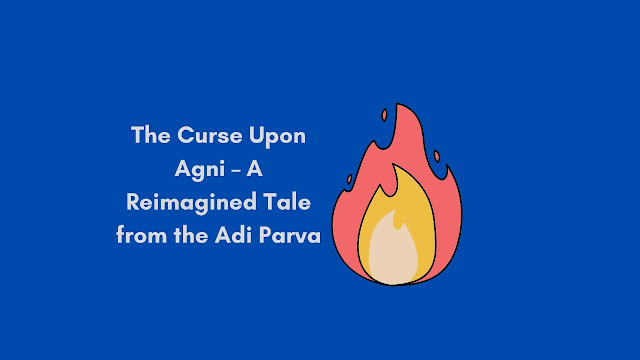Introduction
In the early chapters of the Adi Parva, a profound tale unfolds—one that reveals the complexities of duty, truth, and consequence. This is the story of Agni, the fire god, and the curse that altered his divine role.
Bhrigu Muni, one of the revered sages and the mind-born son of Brahma, had a wife named Puloma. She was radiant, graceful, and deeply cherished by Bhrigu. Yet her past held danger—before marrying Bhrigu, Puloma had been promised to a rakshasa (a powerful demon), who still longed to claim her.
The sage and Puloma lived peacefully in their forest hermitage, far from the world. One day, while Puloma was pregnant, the rakshasa arrived at the hermitage with a burning desire to reclaim her. But he needed confirmation—was this truly Puloma, the one promised to him?
Agni, the omnipresent fire god, resided in the hermitage in the form of the sacred fire used for rituals. The rakshasa questioned him, and Agni, who stood for truth and purity, could not lie. He affirmed her identity and confirmed that she was indeed the same Puloma once promised to the demon.
Armed with this truth, the rakshasa abducted Puloma.
But fate intervened. So disturbed by the abduction, the child in Puloma’s womb was born prematurely. This radiant child, Chyavana, shone with such brilliance that the rakshasa, stunned and scorched by the light, dropped Puloma and was instantly reduced to ashes.
Though the rakshasa met his end, Bhrigu was enraged—not by the demon, but by Agni. In his eyes, Agni had betrayed his trust by revealing Puloma's identity. In a moment of fury, Bhrigu cursed Agni: from that moment on, he would consume everything—pure and impure—without discrimination.
Devastated by this unjust curse, Agni withdrew. He refused to appear in yajnas, homas, and sacred rituals. Without Agni, offerings could not reach the gods or ancestors, disrupting the divine order.
The devas and sages, troubled by the halt in rituals, approached Brahma for help. Brahma summoned Agni and gently addressed his grievance. He acknowledged the injustice and offered a divine blessing: from then on, whatever Agni touched—whether pure or impure—would be transformed into purity itself.
Reassured and restored, Agni resumed his sacred duties. His presence in rituals once again connected the earthly realm with the heavens, and the divine balance was preserved.
The Power of Principle, the Cost of Rigid Truth, and the Need for Reconciliation
This ancient tale offers timeless wisdom for modern organizations:
1. Truth Without Discretion Can Be CostlyAgni's unwavering commitment to truth, though morally sound, led to unintended consequences. In corporate settings, transparency is vital—but it must be balanced with situational awareness and discretion. Know when, how, and to whom to disclose sensitive information.
2. Emotional Decisions Can Undermine JusticeBhrigu’s reaction was driven by personal loss and emotion, not objective reasoning. Leaders must be cautious not to act out of anger or grief. Rash decisions can harm innocent contributors and destabilize teams.
3. The Importance of Reconciliation and EmpowermentWhen Agni withdrew, the system faltered. Only through Brahma’s thoughtful intervention—acknowledging the wrong and offering a new empowering role—was order restored. Great leaders don't just correct mistakes—they uplift those wronged and reintegrate them with dignity.
4. Reinvention Through CrisisAgni emerged stronger: once cursed to consume the impure, he became a purifier. Businesses and individuals can use setbacks as catalysts for growth and redefinition.
In essence, this story is a powerful metaphor for ethical leadership, the responsibility of communication, and the art of turning crisis into strength.

Comments
Post a Comment
Please do not add any spam link in the comment box